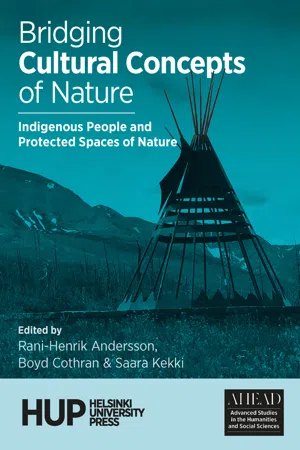
Bridging Cultural Concepts of Nature
Indigenous People and Protected Spaces of Nature
- English
- ePUB (mobile friendly)
- Available on iOS & Android
Bridging Cultural Concepts of Nature
Indigenous People and Protected Spaces of Nature
About this book
National parks and other preserved spaces of nature have become iconic symbols of nature protection around the world. However, the worldviews of Indigenous peoples have been marginalized in discourses of nature preservation and conservation. As a result, for generations of Indigenous peoples, these protected spaces of nature have meant dispossession, treaty violations of hunting and fishing rights, and the loss of sacred places.Bridging Cultural Concepts of Nature brings together anthropologists and archaeologists, historians, linguists, policy experts, and communications scholars to discuss differing views and presents a compelling case for the possibility of more productive discussions on the environment, sustainability, and nature protection. Drawing on case studies from Scandinavia to Latin America and from North America to New Zealand, the volume challenges the old paradigm where Indigenous peoples are not included in the conservation and protection of natural areas and instead calls for the incorporation of Indigenous voices into this debate.This original and timely edited collection offers a global perspective on the social, cultural, economic, and environmental challenges facing Indigenous peoples and their governmental and NGO counterparts in the co-management of the planet's vital and precious preserved spaces of nature.
Frequently asked questions
- Essential is ideal for learners and professionals who enjoy exploring a wide range of subjects. Access the Essential Library with 800,000+ trusted titles and best-sellers across business, personal growth, and the humanities. Includes unlimited reading time and Standard Read Aloud voice.
- Complete: Perfect for advanced learners and researchers needing full, unrestricted access. Unlock 1.4M+ books across hundreds of subjects, including academic and specialized titles. The Complete Plan also includes advanced features like Premium Read Aloud and Research Assistant.
Please note we cannot support devices running on iOS 13 and Android 7 or earlier. Learn more about using the app.
Information
Table of contents
- Cover
- Title
- Copyright
- Table of Contents
- Maps
- Contributors
- Chapter 1: Traditional Indigenous Knowledge and Nature Protection: Collaboration and Changing Paradigms
- Part I: Government Policy and Indigenous Agency
- Part II: Biocultural Diversities Across Bordered Spaces
- Part III: Re-Indigenizing Knowledge and Nature
- Conclusion
- Epilogue
- Index